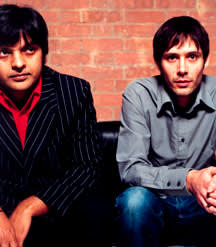Hip-hop might bear the brunt of attacks on the ever-growing guest shot front, but the celebrity cameo is now catching on across the pop spectrum. While it often feels like a marketing ploy, on their latest long-player Handcream for a Generation, Cornershop manages to blend their collaborators just as smoothly on When I was Born for the 7th Time which featured the likes of Allen Ginsberg, Dan "The Automator" Nakamura and hip Southern chanteuse Paula Frazer.
"It was deliberately not planned up-front," explains Ben Ayres, Cornershop's axe-man and tamboura-player, over the phone from London. "When were working in the studio we'd make a quick phone call and get someone down there on the spur of the moment. And the way we worked with Rob Swift was the way we worked with the Automator. He came over and provided some beats."
The X-ecutioner turntablist, who also scratched and helped front-man Tijinder Singh produce a couple tracks, had previously performed a remix for "Candyman" that boasted beats so heavy the band just had to bring him back.
But Swift wasn't the only name brought on board. Chicago soul legend Otis Clay opens the album while ex-Oasis bassist Paul "Guigsy" McGuigan helps diss nu-metal on the first single "Lessons Learned from Rocky I to Rocky III" and Noel Gallagher gets his George Harrison on for the psychedelic, 14-minute epic "Spectral Morning."
But perhaps the most effective cameo came courtesy of the London-based Nazarites' Jack Wilson and Kojak, who morphed "Motion The 11" into an expert exercise in dub reggae. "It was the very first track we started work on and originally it was just keyboards, a beat and me playing a reggae riff. We were very fond of it but we thought it was a bit strange and could do with some vocals to tie it together a bit. Since it was already heading in that direction, we though this is the one time we could do something in a roots reggae style."
Handcream still remains very much a product of Singh and Ayres' expansive vision, but as they travel further afield from the Punjabi pop, indie rock and dance music they've become known for, their hip-hop and reggae tour-guides help the album's stylistic masala stay authentic. And besides, adds Ayers, "it's always nice to have someone else to work with to break things up a bit and hear other people ideas."
"It was deliberately not planned up-front," explains Ben Ayres, Cornershop's axe-man and tamboura-player, over the phone from London. "When were working in the studio we'd make a quick phone call and get someone down there on the spur of the moment. And the way we worked with Rob Swift was the way we worked with the Automator. He came over and provided some beats."
The X-ecutioner turntablist, who also scratched and helped front-man Tijinder Singh produce a couple tracks, had previously performed a remix for "Candyman" that boasted beats so heavy the band just had to bring him back.
But Swift wasn't the only name brought on board. Chicago soul legend Otis Clay opens the album while ex-Oasis bassist Paul "Guigsy" McGuigan helps diss nu-metal on the first single "Lessons Learned from Rocky I to Rocky III" and Noel Gallagher gets his George Harrison on for the psychedelic, 14-minute epic "Spectral Morning."
But perhaps the most effective cameo came courtesy of the London-based Nazarites' Jack Wilson and Kojak, who morphed "Motion The 11" into an expert exercise in dub reggae. "It was the very first track we started work on and originally it was just keyboards, a beat and me playing a reggae riff. We were very fond of it but we thought it was a bit strange and could do with some vocals to tie it together a bit. Since it was already heading in that direction, we though this is the one time we could do something in a roots reggae style."
Handcream still remains very much a product of Singh and Ayres' expansive vision, but as they travel further afield from the Punjabi pop, indie rock and dance music they've become known for, their hip-hop and reggae tour-guides help the album's stylistic masala stay authentic. And besides, adds Ayers, "it's always nice to have someone else to work with to break things up a bit and hear other people ideas."
